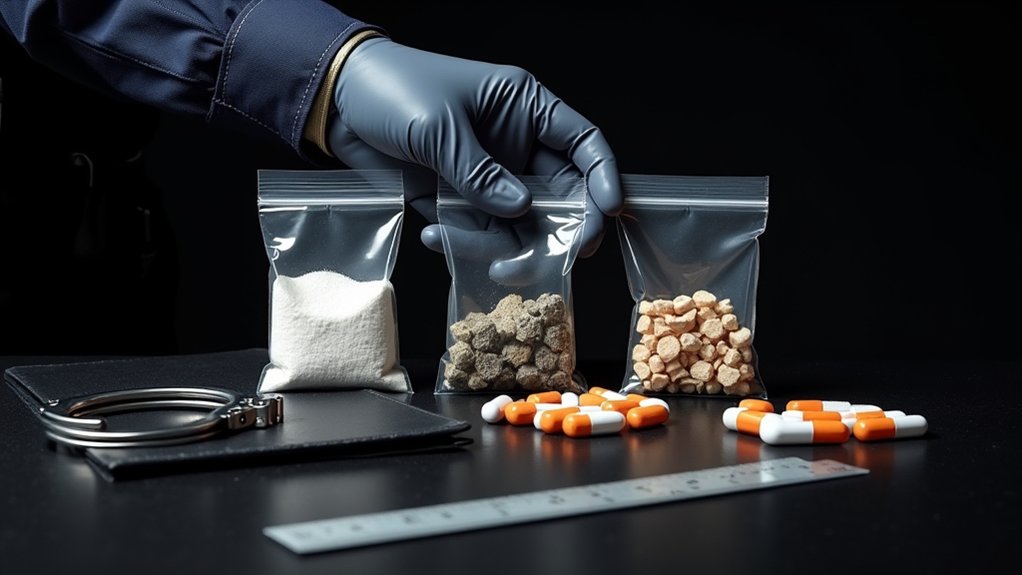Drug possession charges can dramatically impact your life, with consequences ranging from misdemeanors to felonies based on substance type and quantity. You’ll face potential legal penalties that might include fines, imprisonment, and long-term personal restrictions. Prosecutors must prove your intent, knowledge, and control of illegal substances beyond reasonable doubt. The severity depends on drug schedules, prior offenses, and specific circumstances. Uncovering deeper insights could transform your understanding of these complex legal challenges.
Types of Drug Possession Charges Explained

Understanding drug possession charges can be complex, as the legal landscape varies depending on multiple factors. You’ll encounter different classifications based on substance type, quantity, and intent. Simple possession typically involves personal use of controlled substances, ranging from misdemeanors to felonies depending on drug schedule and amount. First-time offender considerations may allow for community diversion programs, potentially reducing long-term legal consequences. Methamphetamine possession carries particularly strict penalties in Illinois, with even small quantities potentially resulting in significant prison time.
Possession with intent to distribute represents a more serious charge, characterized by evidence suggesting planned sale rather than personal consumption. Indicators include packaging materials, large quantities, and significant cash amounts. The severity escalates with drug schedule, with Schedule I substances like heroin carrying the most stringent penalties. Your specific circumstances, drug type, quantity, and prior record will ultimately determine the potential legal ramifications you might face. Under Illinois law, criminal penalties vary significantly based on the specific schedule and quantity of controlled substances involved. Drug manufacturing can dramatically increase potential legal exposure, with substantial penalties designed to deter large-scale production of illegal substances.
Key Legal Elements for Prosecution
When facing drug possession charges, you must understand the critical legal elements prosecutors need to prove. You’ll need to recognize that establishing intent, demonstrating knowledge of the substance, and confirming the illegal nature of the controlled substance are fundamental requirements for a successful conviction. Your comprehension of these key legal components can greatly impact the potential outcome of your case. Federal jurisdiction can significantly influence the complexity of proving these elements, especially when drug possession spans multiple states or occurs on federal property. Constructive possession allows prosecutors to charge individuals with drug possession even when the drugs are not directly on their person, expanding the scope of potential legal consequences. Prosecutors must also prove that the defendant knowingly possessed the controlled substance beyond a reasonable doubt, which requires presenting clear and convincing evidence of the defendant’s awareness and control.
Proving Possession Elements
How do prosecutors establish drug possession charges in court? They build a detailed case by establishing possession evidence through critical legal elements. The prosecution must strategically prove key components that demonstrate your involvement with controlled substances. Legal precedents from state and federal regulations provide comprehensive guidelines for constructing these complex drug possession cases. Prosecutorial strategies often involve careful examination of the defendant’s immediate environment and potential connection to illegal substances.
Key strategies for determining drug quantity and possession include:
- Knowledge Verification: Demonstrating your awareness of the substance’s presence and illegal status
- Control Assessment: Proving direct or indirect dominion over the drug
- Scientific Identification: Confirming the substance’s classification as a controlled substance through laboratory testing
- Circumstantial Evidence: Utilizing surrounding context and physical proximity to link you to the drugs
Prosecutors meticulously construct their arguments by connecting these elements, ensuring a robust legal framework for potential conviction. Different types of possession, such as actual and constructive possession, play a crucial role in establishing legal liability by providing prosecutors with multiple approaches to proving drug-related charges.
Establishing Substance Intent
Precisely what transforms drug possession from a simple charge to a more serious distribution offense? The key lies in establishing intent through compelling circumstantial evidence. Prosecutors must prove beyond reasonable doubt that you planned to distribute, not merely possess, controlled substances. Constructive possession theories expand the legal understanding of how intent can be established even without direct physical control of narcotics. Awareness of substance fundamentally determines the legal interpretation of possession charges, connecting knowledge with potential criminal intent. Nebraska’s Controlled Substances Act creates a comprehensive framework for classifying drug offenses based on the specific scheduling of controlled substances.
| Evidence Type | Distribution Indicators |
|---|---|
| Quantity | Exceeds personal use |
| Packaging | Multiple baggies/containers |
| Equipment | Scales, measuring devices |
| Documentation | Cash, customer lists |
Personal use presumptions hinge on nuanced factors. Drug weighing equipment, large cash amounts, and packaging complexity signal potential distribution intent. Courts examine objective circumstances, quantity, packaging style, associated items, to distinguish between personal consumption and sale preparations. Reasonable inferences matter, but prosecution must definitively demonstrate your deliberate intent to transfer or sell controlled substances, not merely possess them.
Criminal and Personal Consequences

Although drug possession charges might seem like a minor legal infraction, they carry profound criminal and personal consequences that can dramatically alter an individual’s life trajectory. The impact extends far beyond initial legal penalties, creating long-lasting barriers to personal and professional advancement. Nationwide arrest statistics reveal that drug-related arrests account for 26% of all U.S. arrests, underscoring the widespread legal consequences of drug possession. In fact, drug arrests disproportionately affect minority populations, with racial disparities in arrests showing Black individuals comprised 27% of drug arrests in 2019, despite representing a smaller percentage of the total population. Federal prison data indicates that drug offenders have seen a significant reduction in population, with drug prison population decline dropping 24% between 2013 and 2018.
A seemingly minor drug possession charge can derail life’s potential, casting long shadows of systemic disadvantage.
Key consequences include:
- Social exclusion through criminal records that limit employment, housing, and educational opportunities
- Potential imprisonment, probation, or parole that disrupts family and community connections
- Increased stigma that reduces future socioeconomic prospects
- Disproportionate impact on minority communities, particularly Black and Hispanic populations
These repercussions can create a cycle of marginalization, where individuals face reduced opportunities and heightened challenges in reintegrating into society, ultimately perpetuating systemic inequalities and personal hardship.
Understanding Federal vs. State Drug Laws
You’ll find that federal and state drug laws differ markedly in their scope, enforcement, and penalties. While federal laws typically address large-scale operations and interstate trafficking, state laws focus on localized drug offenses within their jurisdictional boundaries. Understanding these distinctions is vital, as they directly impact how drug possession charges are prosecuted and the potential legal consequences you might face. Federal agencies like the DEA have more extensive resources and investigative capabilities to pursue complex drug-related criminal activities across multiple jurisdictions.
Federal Drug Enforcement Scope
How do federal drug enforcement agencies operate within the complex landscape of drug regulation? The DEA leads extensive efforts in international coordination and regulatory enforcement, targeting large-scale drug operations across domestic and international territories.
Key aspects of federal drug enforcement include:
- Jurisdiction Scope: Covers manufacturing, distribution, and cross-border trafficking of controlled substances.
- Regulatory Oversight: Implements Controlled Substances Act schedules and monitors pharmaceutical industry compliance.
- Collaborative Investigations: Coordinates with state, local, tribal, and foreign law enforcement agencies.
- Thorough Prosecution: Emphasizes trafficking and distribution cases with severe federal penalties.
Your understanding of federal drug enforcement reveals a sophisticated, multi-layered approach to combating illicit drug networks through strategic legal and investigative mechanisms.
State Laws Variance
While federal drug laws provide a uniform national framework, state drug laws create a complex patchwork of regulations that dramatically influence how drug offenses are prosecuted and penalized across the United States. You’ll find that diverse sentencing approaches mean what’s a serious offense in one state might be treated more leniently in another. These varying legal approaches reflect local values, public health priorities, and evolving societal attitudes toward drug use.
State legislatures craft nuanced policies that can range from strict criminalization to decriminalization and even legalization for certain substances. Your drug possession charge could result in dramatically different consequences depending on the specific jurisdiction. Understanding this legal landscape requires careful examination of local statutes and recent legislative trends.
Prosecution Jurisdiction Differences
Because drug laws in the United States are complex and multifaceted, understanding the nuanced differences between federal and state prosecution jurisdictions is critical for anyone facing drug-related charges.
Key prosecution jurisdiction differences include:
- Jurisdictional Scope: Federal cases involve interstate or national border drug activities, while state cases focus on in-state offenses.
- Enforcement Resources: Federal agencies like DEA and FBI possess vastly larger budgets and more advanced investigative tools compared to local law enforcement agencies.
- Prosecution Venues: State drug crimes proceed through state courts, whereas federal cases are adjudicated in U.S. District Courts.
- Sentencing Variations: Federal prosecutions typically impose stricter penalties with mandatory minimums, contrasting with more flexible state-level sentencing approaches.
These distinctions profoundly impact how drug possession charges are investigated, prosecuted, and ultimately resolved within the complex legal framework of American drug legislation.
Potential Defense Strategies
When facing drug possession charges, understanding potential defense strategies can substantially impact your legal outcome. Challenging physical evidence becomes critical, focusing on chain of custody inconsistencies and potential flaws in lab analysis. Mitigating intent factors requires demonstrating lack of knowledge, temporary possession, or absence of deliberate control.
Strategic defenses might include proving unlawful search and seizure, exposing police procedural errors, or establishing entrapment. You’ll want to scrutinize witness testimonies, evaluate the legitimacy of warrants, and explore jurisdictional nuances. Constructive possession challenges and prescription defenses can further complicate the prosecution’s case.
Your legal strategy should extensively address procedural inconsistencies, evidence reliability, and intent interpretations. Carefully documented alternative explanations can greatly weaken the prosecution’s arguments and potentially reduce charges.
Sentencing Guidelines and Penalties

After exploring potential defense strategies, understanding the landscape of sentencing guidelines becomes paramount for individuals facing drug possession charges. The legal framework surrounding drug offenses is complex, with considerable variations in potential penalties. Consider these critical aspects:
- Mandatory Minimums: Federal guidelines establish strict baseline sentences based on drug type and quantity.
- Judicial Discretion: Courts can adjust sentences through mitigating factors and individual case assessments.
- Role Evaluation: Low-level participants may receive reduced sentencing through specific guideline adjustments.
- State Variations: Sentencing approaches differ markedly between jurisdictions, impacting potential outcomes.
Navigating these guidelines requires a nuanced understanding of statutory requirements, potential enhancements, and individualized legal strategies. Your specific circumstances, prior record, and case details will ultimately determine the precise sentencing trajectory.
Protecting Your Rights in Drug Possession Cases
Maneuvering drug possession charges requires a strategic comprehension of your constitutional safeguards and legal defenses. Understanding how to challenge unlawful search techniques and constitutional violations can dramatically impact your case’s outcome.
| Defense Strategy | Key Approach |
|---|---|
| Evidence Suppression | Challenge search warrant validity |
| Witness Credibility | Expose inconsistencies in testimony |
| Chain of Custody | Highlight potential evidence tampering |
Successful defense hinges on scrutinizing prosecution evidence meticulously. You’ll need to demonstrate lack of knowledge, challenge substance identification, and expose procedural errors. Entrapment claims can prove effectual when law enforcement inappropriately induced criminal behavior. Remember, the prosecution must prove guilt beyond reasonable doubt, making every technical detail and procedural misstep potentially vital to your defense strategy.
Frequently Asked Questions
Can I Lose My Job if I’m Arrested for Drug Possession?
Yes, you can definitely lose your job if arrested for drug possession. Employment termination risks are high, with over 90% of employers conducting background checks that reveal arrests. Your future job prospects could be severely impacted, especially in sensitive sectors like healthcare, government, and professional licensing. Even without a conviction, the arrest record may trigger disciplinary action, potentially leading to immediate job loss.
How Long Will a Drug Possession Charge Stay on My Record?
A drug possession charge can remain on your record indefinitely unless you pursue expungement options or initiate the record sealing process. Duration varies by state, with misdemeanors typically easier to clear than felonies. You’ll need to meet specific legal requirements, such as completing probation and maintaining a clean record. Consulting a legal professional can help you navigate the complex process of removing this charge from your criminal record.
Do First-Time Offenders Get Different Treatment in Drug Possession Cases?
Yes, you’ll likely receive more lenient treatment as a first-time offender. Alternative sentencing options like drug courts and pretrial diversion programs offer rehabilitation-focused approaches instead of traditional prosecution. These alternatives prioritize treatment, education, and community service over incarceration. You may qualify for probation, mandatory counseling, or drug education classes, which can help you avoid a permanent criminal record if you successfully complete the required program.
Can Drug Possession Charges Affect My Immigration Status?
Yes, drug possession charges can severely impact your immigration status. They can trigger deportation proceedings, lead to visa revocation, and potentially bar you from future entry into the United States. Even minor offenses or first-time possession can initiate removal processes, regardless of your current visa type or length of U.S. residence. Your immigration standing becomes extremely vulnerable with any controlled substance-related conviction.
Will I Go to Jail for Possessing a Small Amount of Drugs?
Your jail time depends on the drug type, amount, and jurisdiction. For small quantities, you’ll likely face a court mandated treatment program or drug rehab program instead of imprisonment. State laws vary considerably, with some offering alternative sentencing for first-time offenders. However, prior convictions, specific drug classifications, and whether you’re near a school zone can increase potential penalties. Consult a local attorney for precise guidance.

